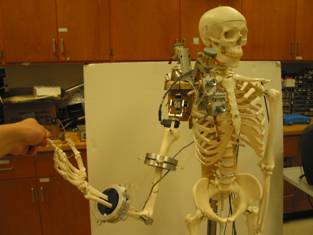Advances in robotics for stroke rehabilitation discussed at Bournemouth
24 July 2009
Bournemouth University’s (BU) pioneering orthosis research and its use in the rehabilitation of stroke patients, was the key discussion among the academic and medical professions at the University recently.
A dissemination workshop, entitled ‘Functional rehabilitation of the motor impaired: robotics and new directions’, was led by BU’s Dr Venky Dubey. Dr Dubey’s research specialises in the creation of a gravity-balancing orthosis to help older people regain or enhance the use of their upper arms during post-stroke rehabilitation.

Dr Dubey's gravity balancing orthosis
The event brought together world-leading experts from the fields of engineering and medicine and featured speakers from Royal Bournemouth Hospital, Salisbury District Hospital, University of Reading, University of Southampton and University of Delaware, USA. The inauguration was given by BU’s Professor Nick Petford, Pro-Vice-Chancellor (Research & Enterprise).
The workshop discussed: robotic exoskeletons for gait assistance and training of the motor impaired; stroke in younger adults; wearable cable driven upper arm exoskeleton for assistance and training; neuroscience and evidence base for technology in neuro-rehabilitation; What can we learn from human cognitive-motor control to build better robots; and rehabilitation engineering in the management of stroke.
Over 50 delegates attended the event. In their feedback, they described the most important thing about the seminar as understanding: “how robots can be used in rehabilitation”, “the importance of integrating engineering with psychosocial factors”, and “the immense contribution of BU research including robotics in stroke rehabilitation”.
Dr Dubey from BU’s Smart Technology Research Centre in the School of Design, Engineering & Computing is delighted that his research is making a vauable contribution. “This was a proud moment for BU to hold such a high level workshop which attracted delegates from London, Manchester and Birmingham.
“I am very pleased with the positive feedback that we have received on the quality of talks and range of speakers. Delegates also remarked on the changing face of BU. This seminar sets the foundation stone for further cutting-edge research in rehabilitation robotics between the engineering and medical professions, led by BU.”
Bookmark this page